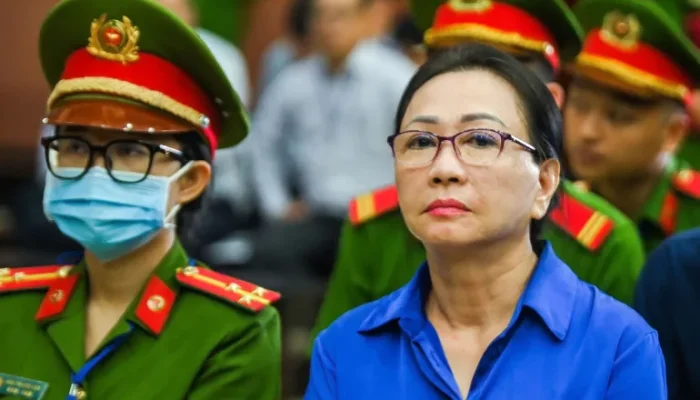A Vietnamese court recently upheld the death sentence of Truong My Lan, a prominent real estate tycoon, for her involvement in a massive $12 billion embezzlement scandal. This ruling, which reverberates through Vietnam’s financial and social sectors, underscores the country’s unrelenting crackdown on corruption but raises questions about its broader implications on the economy and justice system.
The Case and Its Fallout
Truong My Lan, the chairwoman of Van Thinh Phat Holdings Group, orchestrated a fraud of unprecedented scale, involving the illegal control of the Saigon Commercial Bank (SCB). The fallout from her arrest in 2022 was immediate and severe, triggering a run on SCB, one of Vietnam’s largest private banks, and shaking confidence in the financial system.
The fraud affected over 36,000 victims and led to rare public protests in the tightly controlled communist nation. Given the case’s scope, prosecutors argued during the appeal hearing that the consequences of Lan’s actions were unparalleled in Vietnam’s legal history. State-run media noted that the embezzled amount was “unrecoverable,” further amplifying the economic and societal impact.
Sentencing and Conditional Leniency
Initially sentenced to death in April 2023, Lan’s punishment represents the heaviest penalty under Vietnamese law. At her appeal hearing, Lan’s legal team pointed to mitigating factors, such as her admission of guilt, remorse, and partial repayment of the embezzled funds. However, these arguments failed to sway the High People’s Court in Ho Chi Minh City, which rejected her appeal, citing the enormity of the damage caused.
Still, a potential lifeline exists. Under Vietnamese law, Lan’s death sentence could be commuted to life imprisonment if she repays three-quarters of the stolen assets. Whether she can or will meet this condition remains uncertain.
Economic and Social Repercussions
The case has sent shockwaves through Vietnam’s economy and society. With the banking sector already facing pressures from global economic uncertainties, the SCB debacle exacerbated vulnerabilities. Public trust in financial institutions took a hit, as did confidence in Vietnam’s private sector—particularly its real estate market, where Van Thinh Phat Holdings played a significant role.
The broader implications extend beyond economics. The scale of the fraud and the prosecution’s insistence on capital punishment highlight Vietnam’s “Blazing Furnace” anti-corruption campaign, which has intensified since 2022. This sweeping initiative aims to root out corruption among business executives, government officials, and law enforcement. While the campaign has been praised for its rigor, critics argue it risks overreach and potential misuse of harsh penalties as political tools.
Corruption, Justice, and the Future
Truong My Lan’s case is emblematic of the delicate balance Vietnam seeks between enforcing justice and maintaining economic stability. On the one hand, the government’s zero-tolerance stance on corruption resonates with public frustration over systemic graft. On the other, the severity of her punishment, coupled with the economic ripples of her fraud, underscores the high stakes of tackling high-profile offenders.
Lan’s sentencing also raises ethical and legal debates about the use of the death penalty for economic crimes. While capital punishment for such offenses is rare globally, Vietnam continues to employ it as a deterrent. Critics argue that addressing corruption’s root causes—such as improving transparency and regulatory oversight—may yield more sustainable outcomes than imposing the ultimate penalty.
A Watershed Moment
As one of the most prominent figures ensnared by the anti-corruption campaign, Lan’s downfall marks a watershed moment in Vietnam’s fight against economic crime. It also serves as a stark warning to other business leaders. However, her case leaves lingering questions about how Vietnam will navigate the delicate intersection of accountability, economic resilience, and public trust.
The world will be watching as Lan faces her next legal option: requesting a cassation review or retrial. Regardless of the outcome, her story will likely remain a pivotal chapter in Vietnam’s ongoing battle against corruption.




